Here I was, just back from a lovely weekend with friends in Brittany, and I arrived home, opened up my brand-new Mac and found that Word had decided to change the name of the important document I was working on (my next book!) as well as the file type. And, for some reason, it also put it into a file that I never heard of, simply called "Delete.” So after waking up at 6am to catch the only train that wasn’t sold-out today back to Paris, I’ve been on the phone with Apple and Microsoft, and a chat with Dropbox, doing a ‘search-and-rescue.’
So while I’m much rather be baking and writing, and out in the garden with Romain planting the new plants we brought back from Brittany, I’m happy to finish the newsletter I started a few days ago, so you could get it in your inbox on the first…and I can get back to the list of desserts I’m going to make this week after I finish this newsletter and quadruple-check that all the documents are in place and everything is backed up on my computer.
In better news, in spite of Daylight Saving’s Time starting yesterday in France, which means we were basically up at 5am to catch our train this morning, spring has finally arrived in Paris, after what’s said to have been the longest period of rain in the history of Paris.☔
I’m not complaining about that as I happen to be a pluviophile, a person who likes rain, although the grey skies got a little much and it’s a fact that lack of vitamin D (which sunlight provides) can affect your mood, which is why so many of us in Paris get line up at the pharmacies to get our doses.
Although no one likes to hear anyone complain about Paris, complaining has been called the national sport…
Complaining (and going on strike) is how things happen around here. Or sometimes, how they don’t happen—which is often the intended effect. That’s why people on France go on strike: To fight for things they believe in. I’m self-employed so the only people who’d be affected if I went on strike were you, and I don’t really have any complaints about you. In fact, I’m happy you’re here…especially after the day I’ve had when I need you the most.
When I moved to France, my American friends were a little shocked at how much complaining I did when they’d see me, because it becomes a habit, and it’s not considered a negative thing in France. Complaining means you’re part of the “in” crowd and actually means you’re discerning. I translated that to Romain once as discriminating, but then I had to (deftly) explain the difference between discrimination (which is a bad thing) and discriminating, which can be a good (or bad) thing.
Similarly, French has a lot of words that sound similar, but mean something different. Such as huitres and huit (oysters and eight), and verre, ver, and vers—glass, worm, and towards. I never dreamed that my job as a baker would one day be eclipsed by having to learn about etymology, word origins, grammar, typos, and so forth. And once again…I miss baking!
Until I can get back to that, I’ve been honing my skills in the fish and shellfish department as we’ve joined a weekly CSA-type organization, Poiscaille, which connects fishermen and women with consumers, allowing us to purchase seafood and shellfish that’s responsibly harvested and fished. The large-scale harvesting of scallops, called St. Jacques in French, is detrimental to the oceans, and these beauties are hand-harvested, so they’re not sandy and they don’t need rinsing, which removes a lot of their flavor.
I’ve gotten a lot better at it - my first few shucks resulted in a few scallops looking like someone fished them out of a paper shredder, but now that I’ve gotten the hang of it, I enjoy opening them, and their flavor is delicious. We’ve even got new composting bins in our neighborhood and we can put the shells in there, to get composted as the city aims to reduce the 450 kilos (almost 1000 pounds) of waste that each person produces in Paris per year. I still haven’t ordered the live eels they’ve been encouraging us to add to our orders—I still have a bit of trauma from when a chef I worked with ordered a whole bunch of them and they kept slithering out of the sink in the kitchen he thought would contain them, and I’m not tempted to repeat that episode at home.
Last month a lot of people were under the weather in Paris. It happens every year in the winter but this year seemed particularly fierce. Whatever I had held on for a good three four weeks, then Romain got hit by something similar, but different. Fortunately we are able to get same-day housecalls here (I wrote a bit about the French healthcare system here), and we started feeling better, although it did make me wonder what people in France do when they get sick, and what they eat.
In the U.S., we often resort to chicken soup, which is warming, not too irritating to the system or digestion, nutritious, and able to deliver some vitamins, if you add carrots, or carbs, if you make matzoh balls. Unfortunately when you’re barely well enough to drag yourself to the grocery store for a chicken and some vegetables, grinding pain azyme (matzoh) and making matzoh balls probably isn’t in your wheelhouse. French people do eat a lot of soup, which you can buy already made, but they’re often veloutés, creamy or puréed soups, and I need/want broth, which isn’t sold here, but should be.
I make a sort of poule au pot, of sorts, where I just put a whole chicken, salt, carrots, and a leek in a stockpot, cover with water, and simmer for at least an hour. I might add some bay leaf or thyme and a few peppercorns, but the best is to add some chopped dill to the finished soup. They don’t use a lot of dill in France, so that was a surprise to Romain, and I felt bad I couldn’t find any when he was needed soup.
In my last newsletter I wrote a little screed against all the overloaded foods that people are piling sky-high and cramming in their mouths on social media, and mashups like Crookies, chocolate chip cookie dough croissants, which have become a “thing” in Paris, believe it or not. (Breaking: I also recently saw on IG someone stuffing babka with raw chocolate chip cookie dough in Paris.)
I saw my local bakery offering them and I asked how they were selling, and the owner said, “Very well!” and she offered me one. (Shown at the very top of the newsletter.)
When I pulled it from the bag, it was kind of a mess as the butter had soaked through it by the time I got home. I pulled off a corner and took a bite; it tasted like half-baked cookie dough surrounded by butter-soaked pastry. It was redundant, while at the same time, discordant. It’s kind of like putting pasta on pizza—they’re both related, but they have nothing to do with each other.
I’m not a calorie-counter, but at around 900-1000 calories, that’s just under half of my recommended intake. (A doughnut is around 200-250 calories, a bagel with cream is 400-600 calories, and a croissant is 400.) I’m all for indulging in delicious things, and I moderate what I eat so that I can eat everything. But I don’t think I’ll be indulging in any more Crookies.
Probably not the best transition😆, but lastly, if you’re in Paris, I’ll be at the American Library on April 2nd in conversation with Amanda Bankert of Boneshaker Donuts, who came into my kitchen to make vegan marshmallows with me, which Romain preferred to the traditional ones. Note that the event is free but you must RSVP here.
-David
Links I’m Liking
-This caused a bit of a ruckus last month: Should cookbook reviews be more critical? (Lottie + Doof)
-I also came across this interview with me from thirteen years ago(!) about my life in Paris. (Laurel Zuckerman)
-The brand-new Olympic athlete village in Paris will not be air-conditioned (in July and August), so organizers are telling athletes they’re welcome to bring and install their own air-conditioners. (NYPost)
-Is the Green Chaud, hot chocolate with Chartreuse, just an American fantasy? (Taste)
-A number of people asked me about buying Not Frères pottery, after I featured them here:
They don’t ship, but I noticed Château de Gudanes is selling select pieces of their pottery in their shop, including a cassole for cassoulet, with worldwide shipping. (Shop the Château)
-CNBC dives deep (video) into why the French love American fast-food so much. via
-A Museum of Cheese in Paris slated to open in early summer on the Île Saint-Louis with demonstrations and tastings. (Musée du Fromage)
-Wanted: An apartment in Paris — the race to find an apartment to rent gets (even more) heated. (France24)
-Michelin announces its 2024 guide to starred restaurants in France, but Michelin’s own director wonders: “Where are the women?” (Euronews)
-Paris revives legendary café waiter’s race. (NYT/unlocked)
Something In My Kitchen
I thought I’d start doing occasional write-ups of things I have in my kitchen that I like and use frequently. Like most of you, my kitchen space is ultra-valuable and I try to buy things that I really will use. I’m not opposed to single-use appliances (no…I’m not giving up my espresso maker or toaster…and I have been eyeing one of those countertop pizza ovens) but I resisted buying a hot water kettle for a long time. It seemed like a silly thing to own…heck, I am perfectly capable of heating water in a saucepan on the stove—-Why did so many Europeans have them? and What are people doing with all that hot water? Surely that many people in France aren’t drinking tea.
We’re not big tea drinkers, but we do sometimes make a tisane or infusion (herbal tea), which are also French strategies for prolonging an evening. And now that we have lemon verbena and mint growing right outside, it’s like free food. And who can argue with free tea?
A hot water kettle will bring a liter/quart of water to a full, rolling boil in 2-3 minutes. Even if you don’t make tea, it’s great for heating water for pasta or boiling potatoes. It’s a lot faster than on the stove—and more efficiently, too, unless your stove is induction, like we’re using now. Before switching to induction, I used our hot water kettle to fill my moka pot in the morning with hot water. Most “experts” say the best way to get good coffee from a moka pot is to start very hot water in the bottom. (No matter where you live, hot water from the tap shouldn’t be used as drinking water as the pipes aren’t very clean, and the water from them isn’t good for you.)
Kitchen counter space is a big deal for me, but I’m happy to share some with my hot water kettle. Some kettles with a lot of bells and whistles, and people who brew coffee and tea carefully enjoy having temperature controls, but we’re fine with our simple model that has an On/Off switch, and that’s it. I’ve used the Amazon Basics kettle in the U.S., which works well and is affordable, and the H. Koenig one I got in France works fine, although I would say if space is limited, find one with the smallest footprint. (If you have an NYT subscription, Wirecutter reviewed their favorite hot water kettles. CNN, Serious Eats, The Telegraph, and Wired also listed their favorites.)
I do like the style of this stainless-steel Aarke one (above), although at $250, I’m not sure I like hot water that much… But like changing my mind about hot water kettles, I reserve the right to change my mind about getting that kettle. And about getting a pizza oven, too.




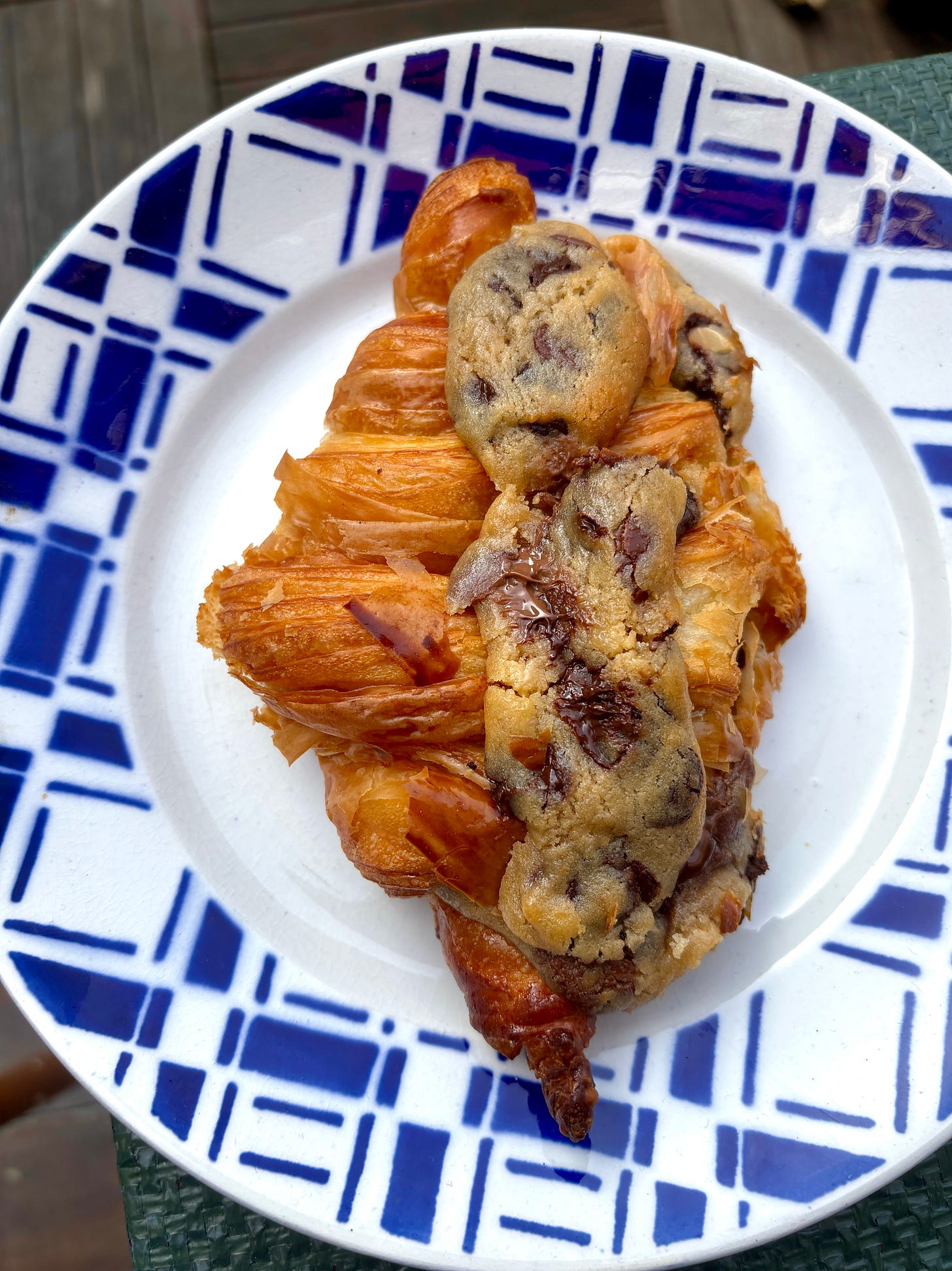



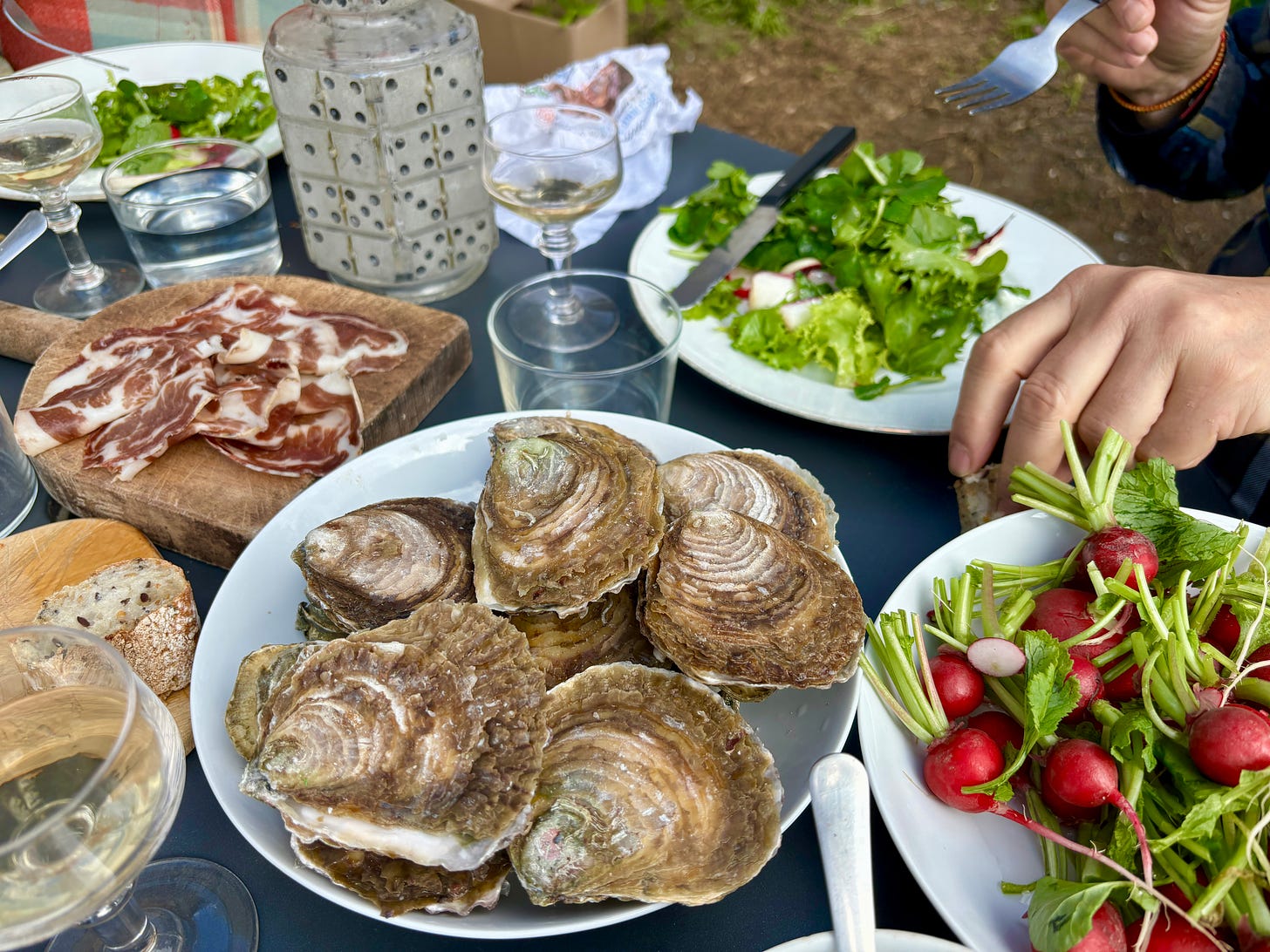
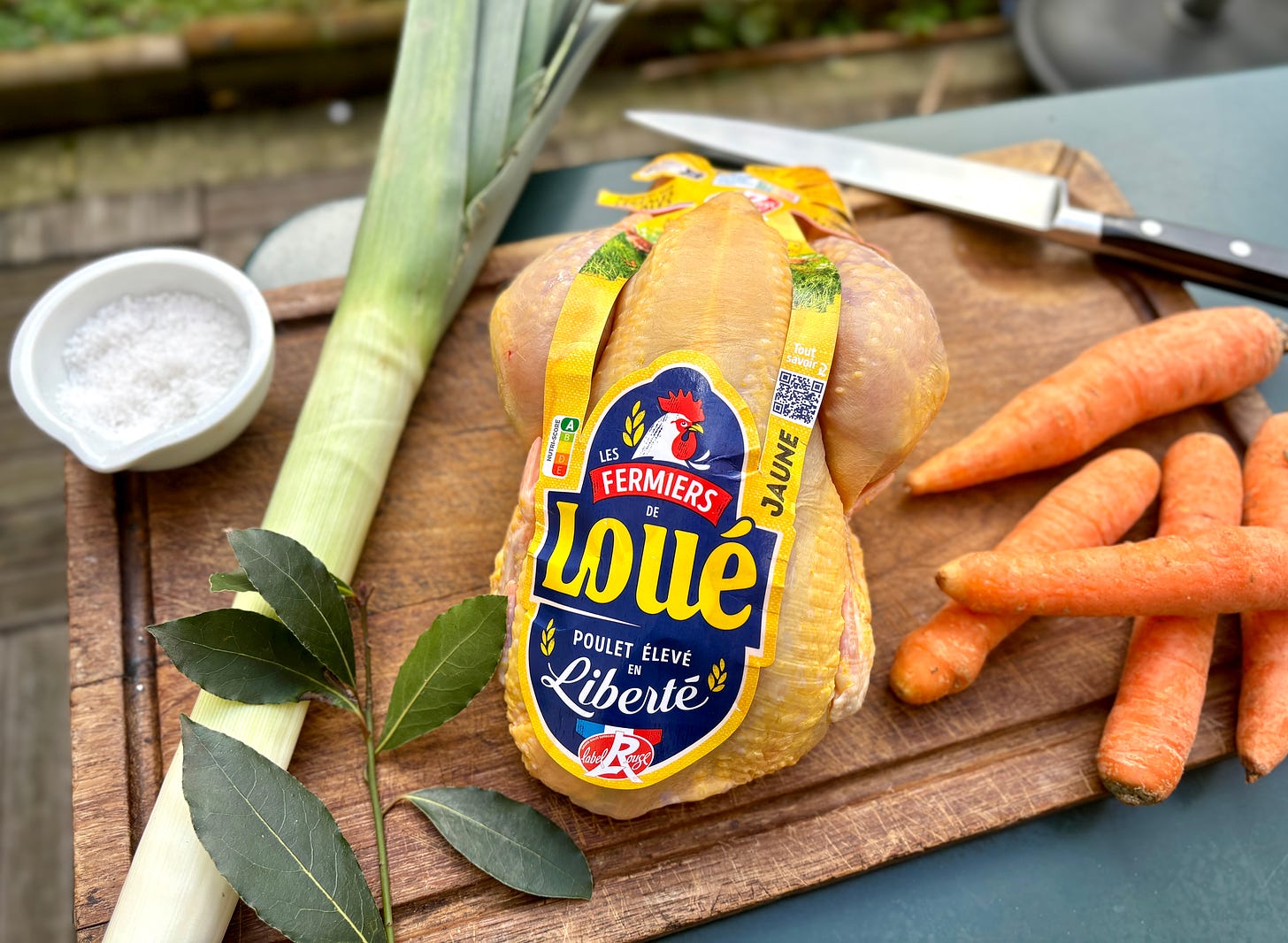
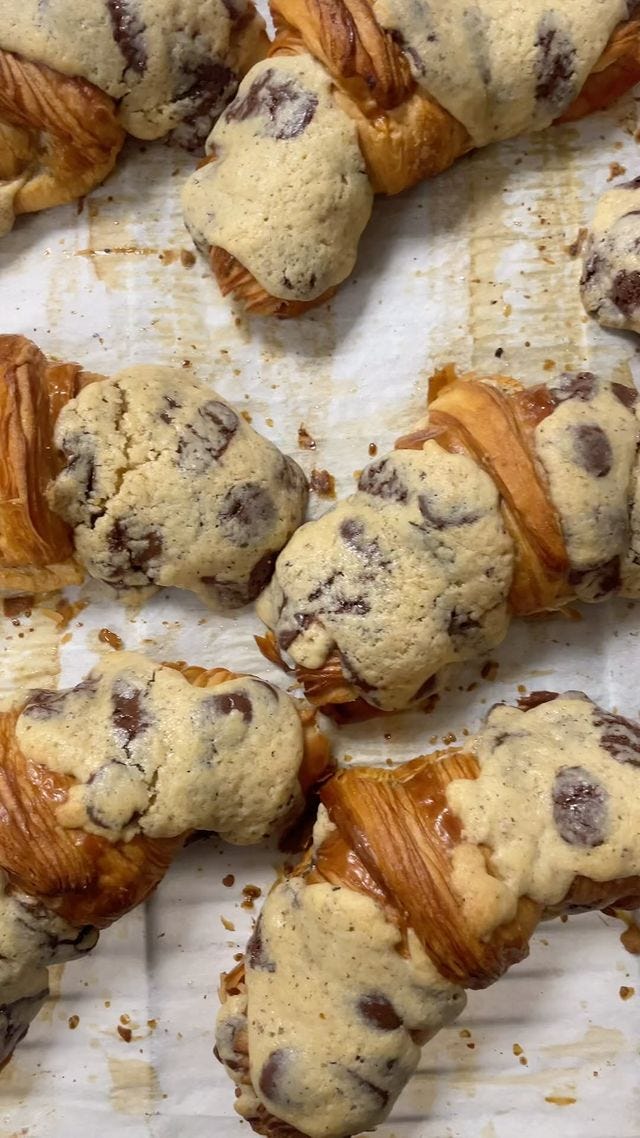
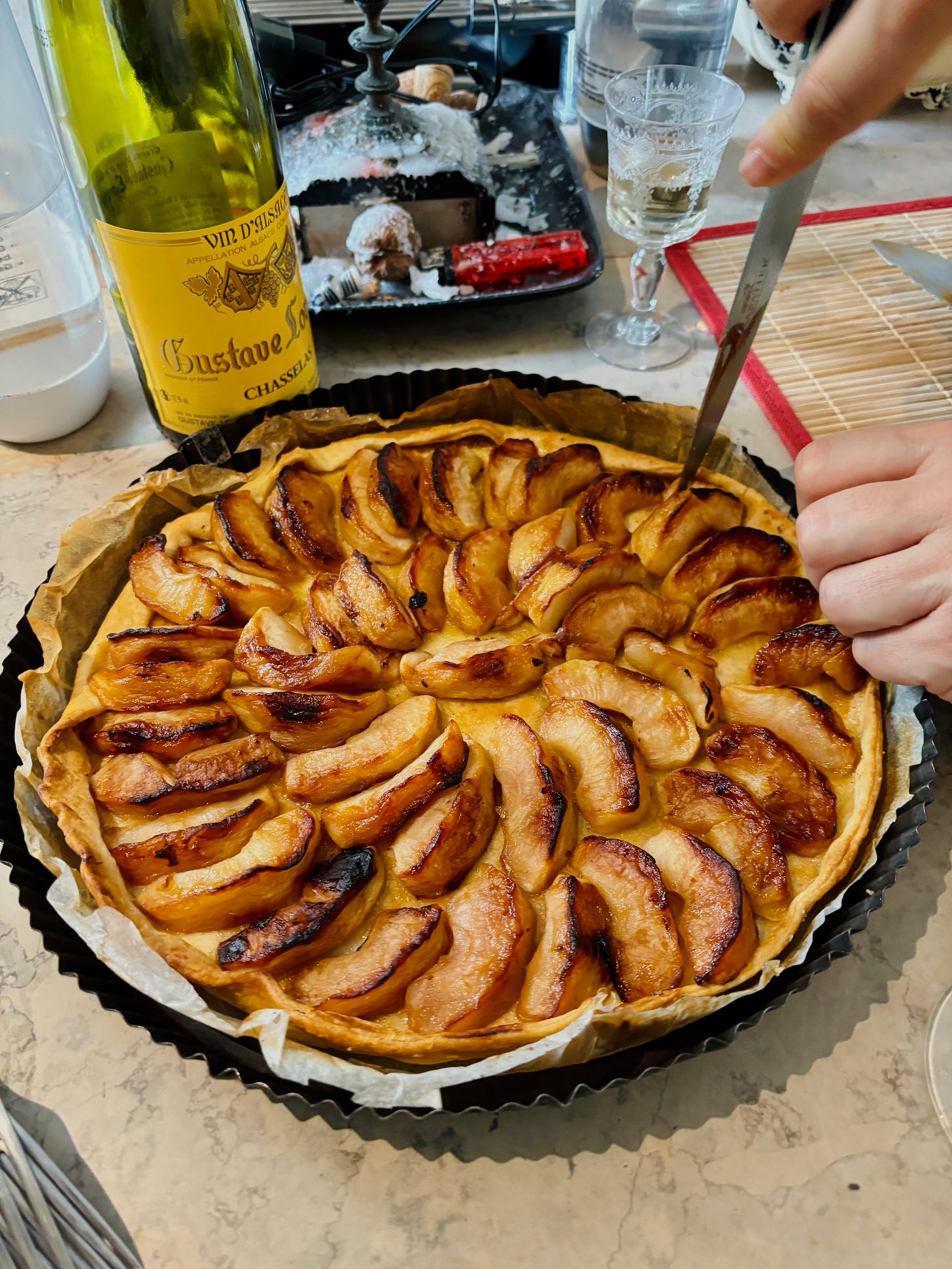

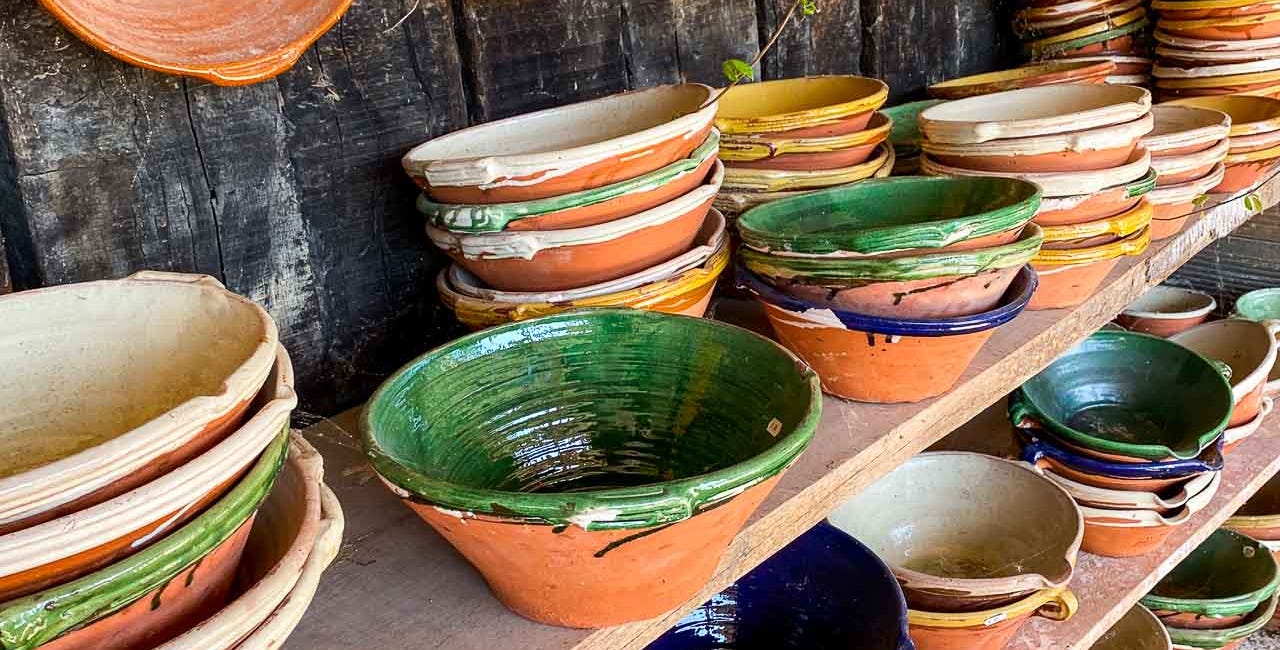

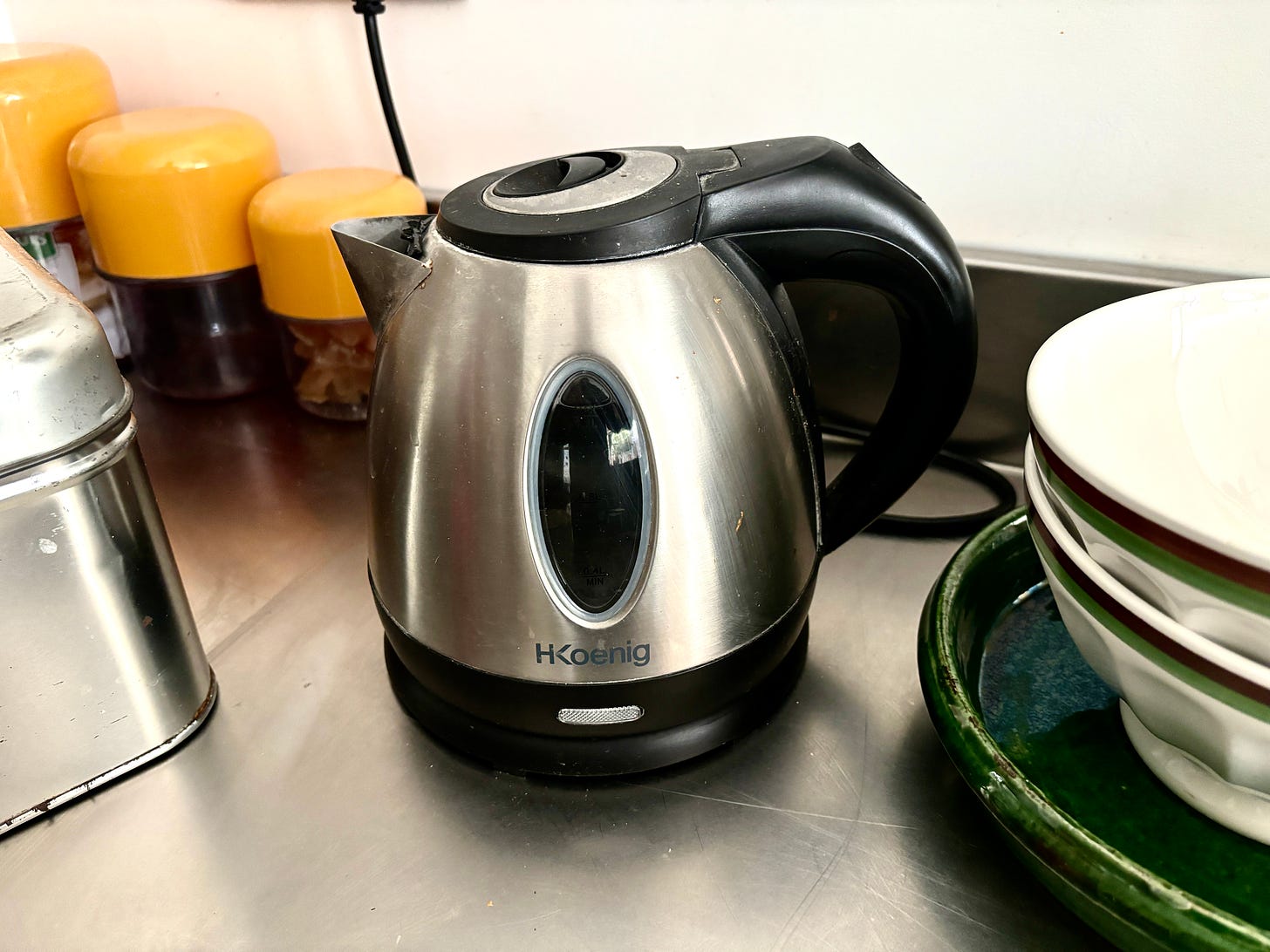


I'm no purist, but those croissant / cookie mashups look hideous.
I just love your blog & books about living in France! Thanks ever so much for sharing your interesting life & insights from one of my favorite parts of the world.
Keep up the great work!